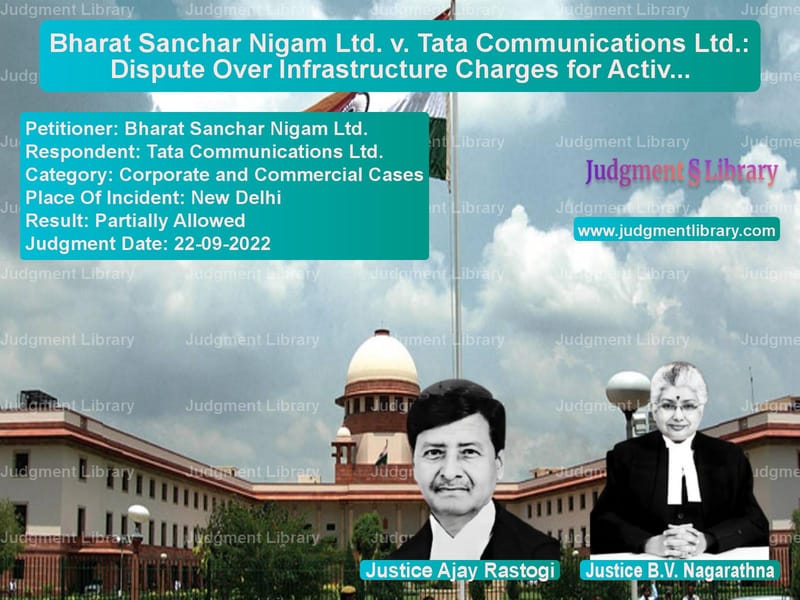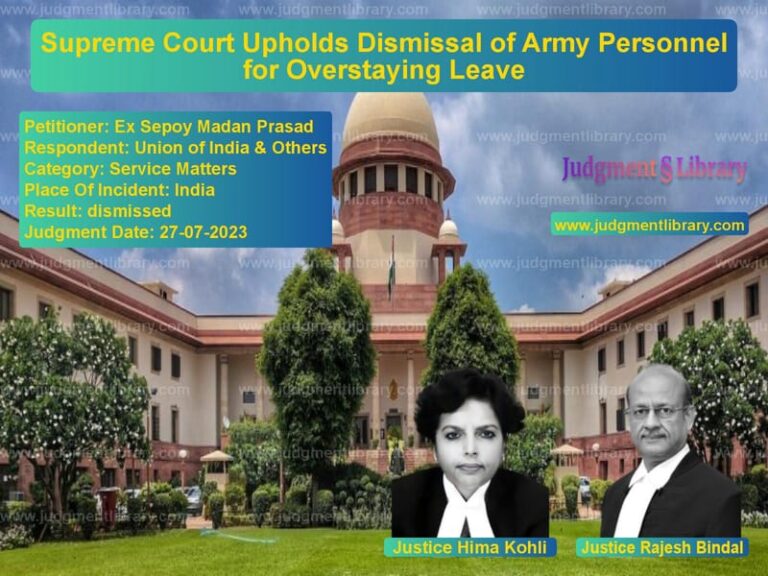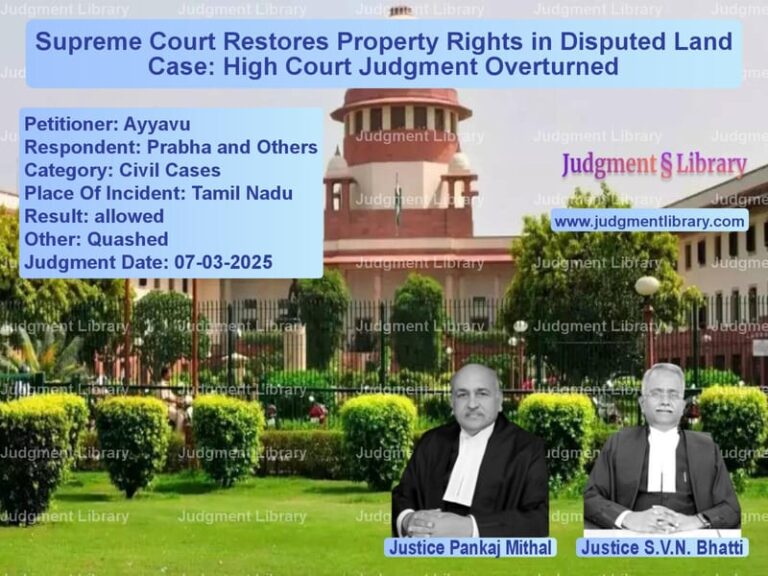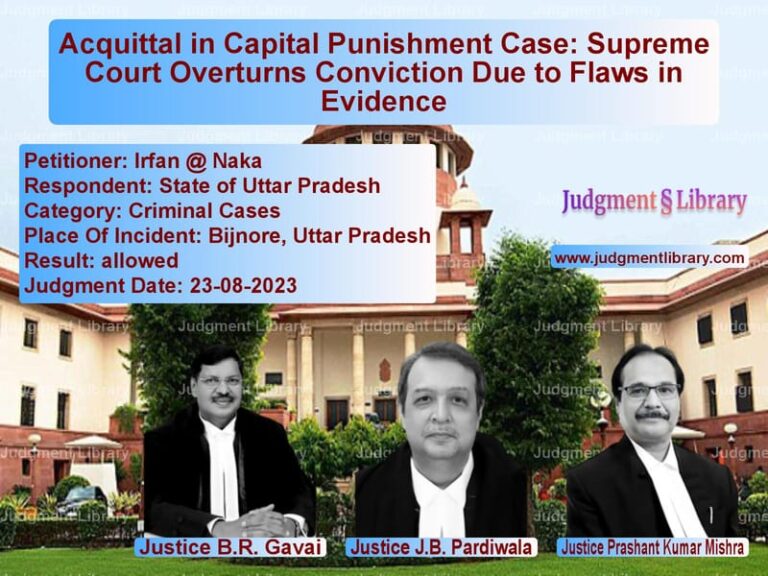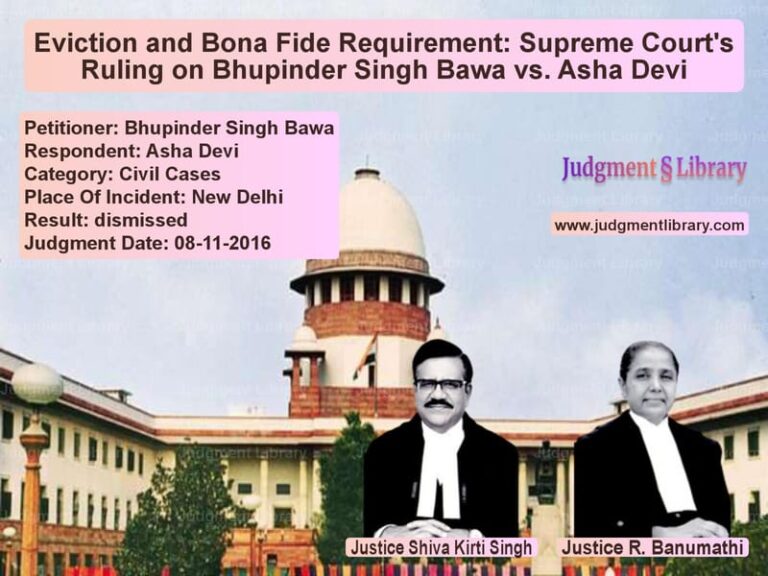Bharat Sanchar Nigam Ltd. v. Tata Communications Ltd.: Dispute Over Infrastructure Charges for Active Links
The case of Bharat Sanchar Nigam Ltd. (BSNL) versus Tata Communications Ltd. revolves around the issue of infrastructure charges for active links used by licensed telecom service providers. The appellant, BSNL, challenged the Telecom Disputes Settlement and Appellate Tribunal’s (TDSAT) decision regarding the revised infrastructure charges that were made effective from 1st April 2009. The dispute concerned the retrospective application of these charges and whether it was legally justifiable for BSNL to demand the increased rates from the service providers from 2009 onwards.
The dispute traces back to a circular issued by BSNL in 2006, which set infrastructure charges for telecom operators leasing equipment and using infrastructure. These charges were updated in 2012, but the key issue arose when BSNL tried to apply the revised charges retroactively from 2009, despite the fact that the service providers had already made upfront payments according to the earlier rates. The respondents, including Tata Communications Ltd., contested the retrospective application of the revised charges, leading to a protracted legal battle.
The facts of the case show that the respondents entered into interconnection agreements with BSNL under which BSNL was to provide certain infrastructure services, such as space for telecom equipment, power supply, and tower space. As per the interconnection agreement, these charges were revised periodically. In 2006, BSNL issued a circular revising the infrastructure charges for these services. This was followed by another circular in June 2012, which further revised the charges. The 2012 circular sought to apply the revised charges retrospectively from April 2009, with an annual increase of 10%. This led to the issue of whether BSNL could demand payments for infrastructure charges for the years 2009-2013 based on the revised rates.
Read also: https://judgmentlibrary.com/corporate-insolvency-resolution-process-a-case-of-co-borrower-liability/
The respondents challenged the retrospective application of these revised rates, arguing that the charges should only apply from the financial year 2013 onwards. They contended that charging based on the revised rates from 2009 onwards was unfair, as the original agreement did not specify such revisions, and the service providers had already made upfront payments based on the older rates. The respondents emphasized that they should not be subjected to additional payments for previous years under the revised circular.
BSNL, on the other hand, argued that the telecom industry had undergone significant changes since 2009, and it was necessary to adjust the infrastructure charges to reflect those changes. BSNL contended that the revised charges were not only justified but also necessary for the continued provision of telecom services. The appellant also argued that the circular issued in 2012 was meant to correct discrepancies and ensure that the charges kept up with inflation and other market factors.
The Telecom Disputes Settlement and Appellate Tribunal (TDSAT) ruled in favor of the respondents, stating that while BSNL had the right to revise the charges, it could not apply the revised rates retroactively to the period before 2013. TDSAT emphasized that retrospective application of charges was not legally sustainable, and the respondents were not obligated to pay the increased rates for the period prior to 2013. However, TDSAT acknowledged that BSNL was entitled to revise its charges prospectively, starting from 1st April 2013, and that the service providers would be required to pay the revised charges from that date onward.
BSNL then appealed the TDSAT’s decision, arguing that the Tribunal had erred in its interpretation of the applicable rules regarding retrospective application of charges. BSNL’s counsel argued that the revised rates were legally valid, and the retrospective application was necessary to account for the delay in implementing these changes. BSNL further argued that the service providers had benefitted from BSNL’s infrastructure, and they should not be allowed to avoid the revised charges simply because they had already paid for previous years at the older rates.
The respondents, represented by their counsel, countered this argument by asserting that the charges should not apply retrospectively. They argued that the agreement did not allow BSNL to retroactively change the terms, and the service providers had already made the necessary payments under the prior rates. The respondents further pointed out that the retrospective nature of the charges would place an unfair financial burden on them, as they had no notice of these changes when making the upfront payments for previous years.
The Supreme Court considered the arguments presented by both sides. The Court examined the applicable provisions of the Telecom Regulatory Authority of India (TRAI) guidelines, which regulate the charging of infrastructure and interconnection charges. The Court also considered the impact of retrospective application of changes in fees, particularly when those changes would affect past payments. In its ruling, the Court held that the revised charges could not be applied retroactively from 2009, as the respondents had already paid for the previous years in accordance with the earlier circular issued in 2006.
The Court acknowledged BSNL’s right to revise its rates in response to market changes but concluded that such revisions must be prospective, starting from 1st April 2013. The Court also directed that any excess charges collected from the respondents between 2009 and 2013 under the revised rates should be refunded, along with interest, as stipulated in the interconnection agreements.
The judgment of the Supreme Court reaffirmed the importance of clarity in contractual agreements and the need for transparency in charging practices. It reinforced the principle that changes in rates and fees must be applied prospectively, and that service providers should not be subject to unexpected financial burdens arising from retrospective adjustments. The Court’s decision also highlighted the importance of adhering to the principles of fairness and justice when revising contractual terms, particularly in industries as critical as telecommunications.
Petitioner Name: Bharat Sanchar Nigam Ltd..Respondent Name: Tata Communications Ltd..Judgment By: Justice Ajay Rastogi, Justice B.V. Nagarathna.Place Of Incident: New Delhi.Judgment Date: 22-09-2022.
Don’t miss out on the full details! Download the complete judgment in PDF format below and gain valuable insights instantly!
Download Judgment: bharat-sanchar-nigam-vs-tata-communications-supreme-court-of-india-judgment-dated-22-09-2022.pdf
Directly Download Judgment: Directly download this Judgment
See all petitions in Company Law
See all petitions in Mergers and Acquisitions
See all petitions in Corporate Governance
See all petitions in Bankruptcy and Insolvency
See all petitions in Corporate Compliance
See all petitions in Judgment by Ajay Rastogi
See all petitions in Judgment by B.V. Nagarathna
See all petitions in partially allowed
See all petitions in supreme court of India judgments September 2022
See all petitions in 2022 judgments
See all posts in Corporate and Commercial Cases Category
See all allowed petitions in Corporate and Commercial Cases Category
See all Dismissed petitions in Corporate and Commercial Cases Category
See all partially allowed petitions in Corporate and Commercial Cases Category

